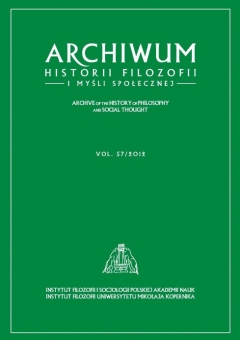Some Remarks on Husserl’s and Seiferts’s Ontology of Propositions
Some Remarks on Husserl’s and Seiferts’s Ontology of Propositions
Author(s): Dariusz ŁukasiewiczSubject(s): Phenomenology, Ontology
Published by: Instytut Filozofii i Socjologii Polskiej Akademii Nauk
Keywords: Husserl; Seifert; ontology; judgment; proposition; meaning; relation; truth;
Summary/Abstract: In the article I present and compare two conceptions of the ontological status of propositions (meanings of sentences). The first was formulated by Edmund Husserl, the founder of phenomenology, in the early period of his philosophical activity, and the second by Josef Seifert, the contemporary Austrian phenomenologist. On Husserl’s view, a proposition is an ideal abstract exemplified by particular acts of judging. The relation of exemplification is dichotomous: a proposition is exemplified or not. The critical point of this theory is that the meaning or sense of our mental acts is changeable, and the proposition as a kind of ideal being is not. Seifert’s theory attempts to explain variability of meanings by replacing the relation of exemplification with that of participation. Participation has degrees, and therefore a judgment made by a human subject may be more or less similar to the ideal proposition in God’s mind. The extent of that similarity can be bigger or smaller, and this gradation of similarity provides an explanation why meanings can change without thereby abandoning the absoluteness of truth.
Journal: Archiwum Historii Filozofii i Myśli Społecznej
- Issue Year: 2012
- Issue No: 57
- Page Range: 251-263
- Page Count: 13
- Language: English

